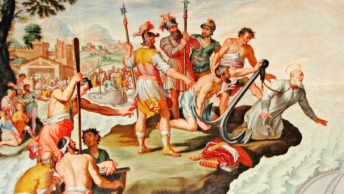Jesus tells the formerly hemorrhaging woman: “Daughter, your faith has saved you. Go in peace and be free of your affliction.” (Mark 5:34)
And to distraught Jairus: “Do not be afraid; just have faith.” (Mark 5:36)
This day, and every day, Jesus offers himself to us as the source of inner peace and freedom from fear, especially paralyzing fear, if we wholeheartedly place our faith in him. The Catholic Church has the deepest knowledge of Christ Jesus, her divine Bridegroom. For over 2000 years she has shared this intimate knowledge with billions of believers. So many of them have had their lives transformed by his teachings, healing power and infinite compassion.
Throngs of them could profess their loyalty to him to the point of shedding their blood. Consequently, our decision to trust in him, even whenever tested repeatedly and severely by the trials of life, should be made rather easily due to the wealth of such indisputable testimony.
This colorful passage from the Gospel of Mark (5:21-43) provides us with a reliable tool for determining the mettle of our faith by comparing it first with the “lite faith” or “fake faith” of the faceless groups in this narrative. We can safely assume that the large crowd gathered around Jesus has from “lite faith” to “fake faith.” They should be working in the fields or at the local mill or getting ready to fish the following night. Hence, what drives them to spend the day around Jesus could be curiosity or to scratch the “itch” of wanting to see sensational miracles.
Jesus’ own disciples display “lite faith” because they are still unfamiliar with who Jesus truly is. They cannot yet tell the difference between being touched inadvertently by people hemming Jesus in and a timid touch prompted by daring, genuine faith.
Those who intercept Jairus and tell him to desist from disturbing the Teacher any longer cannot go past seeing in him a mere good, nice teacher. They accept, tacitly, the untimely loss of their twelve-year-old girl who should be getting ready to start her own family. Those weeping and wailing loudly, not only do not place any faith in Jesus, but they ridicule him for objecting to their paid assignment of providing the traditional lamentations and funerary cries.
Now, relying on the wealth of knowledge that the Church has of her divine Groom, we should ask: Who is Jesus to change so radically, so “illogically,” the human perspective of illness and death? God himself leads the hemorrhaging woman to trust in Jesus as the last resort available to her after the many failures of doctors and all other remedies which exhausted her savings over a period of twelve endless years.
She heard about Jesus’ healing power, but she is still outside his reach because she cannot tell him about her extremely embarrassing condition in front of so many people. The simplicity and the genuineness of her faith, promptly recognized by Jesus, are God’s work who reveals to her that even a furtive, quick touch of the tallit’s fringe of his Son Jesus would cure her affliction.
From this woman’s daring conduct we can already have a first assessment of the level of our faith in Jesus. We can see if our faith in him is such that it would allow us to find peace and lead a life of direct engagement, productivity and contentment. From this beautiful page of Mark’s gospel, we are also learning that the Father has “packed” his Son Jesus with explosive healing power and immense compassion.
But this power is available mainly to those who grow in the belief that the Lord is always very close to them and that he is waiting for them to shed any pretense and sophistication, and replace them with humility seasoned by daring, clever resolve. We learn that nothing which troubles us is too insignificant or trivial to be ignored by our Lord who experienced firsthand all that can afflict human nature.
However, the highest level of faith that Jesus urges Jairus to muster at the death of his young daughter is achieved by full, constant cooperation with God’s grace in the way we face ordinary trials and common difficulties. Jairus displays genuine faith by his courage in coming forward as synagogue official, in doing homage to Jesus and in pleading earnestly for his daughter’s life. Jairus places his trust in Jesus and in his power despite what his own people tell him about not importuning the Teacher after the inevitable has already happened.
Similarly, we must be ready: at times, Jesus demands faith which firmly believes that nothing is impossible with the God of life. So, are there any miracles we expect from Jesus as we draw closer to touch him in Holy Communion?
My dear fellow recipients of this most precious gift of faith from God, we should never desist from pressing upon Jesus with steadfast hope and let him touch us again and again. There is no one else who could do that while, at the same time, granting us inner peace and allaying all our fears. As we make our requests, we should keep in mind that he is truly God among us, but with such a direct and detailed care for all aspects of our life that his power and concern extend from bringing a twelve-year-old girl back to life to making sure that she should be given something to eat!








